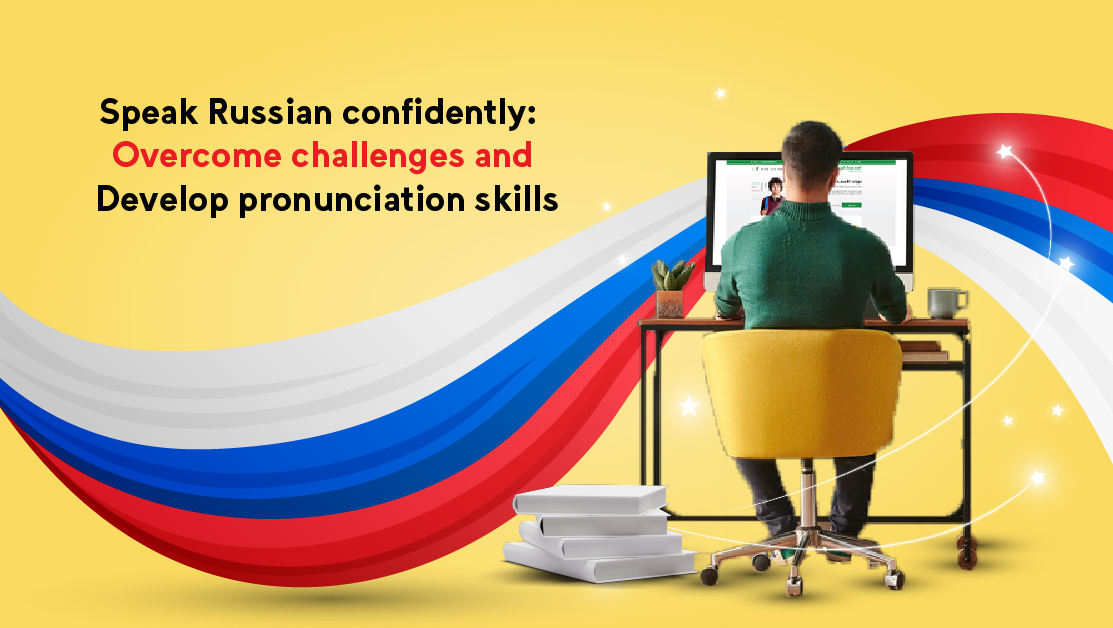
The Russian language holds a prominent position as the largest native language spoken in Europe and the Eighth most spoken language in the whole world, mostly from the main country Russia, which is the largest country in the world.
The Russian language is known for its melodies and tone known for having variable sounds and tones, which makes it unique from the other languages, it has the beauty of the ancient Slavic language and the distinct writing style of the Cyrillic letters.
You can notice how varied and how forked the language is with its grammatical intricacies, including cases, verb conjugations, and a nuanced system of gender agreement which allowed for better expression.
Along with the grammatical diversity, we can’t forget about the sounds and features that made it one of the most distinct languages hard yet enjoyable and makes it more like a poetic rhythm, so let’s get to know about them more and how we can learn them.
What are the skills needed for Russian pronunciation?
In order to learn the Russian pronunciation or to speak Russian you must know the main features of the sounds and the phonetics, let’s mention some of the sounds and letters features of the Russian language:
- Russian phonemes
-
- These are the phonemes that are considered unfamiliar to some languages and that are not pronounced in the same way that some sounds may be known in most countries of the world, including (и) (i), (у) (u), (э) and (e).
- Like the letter (е) (ye): as in (зеленый) (Zeleny), which means green.
- Sibilant and Affricate Sounds
-
- The Sibilant sounds are characterized by having this hissing and buzzing sound, as the air is going through a narrow channel in the mouth.
- However, the Affricate sounds are characterized by blowing the air after blocking it for a short time like the explosive sounds in English.
- Among them are the sounds (ш) (sh), (ж) (zh), and (ч) (ch). Examples of these are:
- Example: the word (щука) (shchuka), which means salmon.
- Example: (школа) (shkola) which means school.
- Open and close vowels
-
- These vowels are familiar to the previous ones as they are also related to the resistance of the air, so the closed vowels usually block the air partially, however, the open vowels don’t, examples of Close vowels include (и) (i), (ы) (y), (е) (ye), and (ю) (yu). Open vowels include (а) (a), (о) (o), and (э) (e).
- Example: (минута) (minuta) which means minute, and (рыба) (Ryba) which means fish.
- Example: (кот) (kot) which means cat, and (правда) (Pravda) which means truth.
- Accent
Russia is a very large country with plenty of variable communities, as a result, you will find too many accents that could be unfamiliar to a new learner, they change the sounds of the letters and their usages depends on each area or town you’re in, so don’t get confused that’s normal.
- intonation
The Russian language is one of the few languages that are affected by the intonation or the tone of the speaker, some words could be changed in meaning if their tone is different, such as the word большо́й, which means (a lot) when it has a downward tone, and it means (big) when it has an upward tone.
- The double letters
In the Russian language, you can find plenty of letters that can have more than one pronunciation, the sounds could change in different positions or if they’re followed or precedented by some sounds.
- Like the verbal variation in vowels:
For instance, if there is a word that is finished with a vowel sound; э, а, ю, я е, ё, о, у, и, ы, it could be pronounced differently depending on the followed letter or its position in the word.
How to speak Russian
Since we mentioned the main features that the Russian sounds have, we need now to know how we can speak or pronounce them correctly, and here are some tips:
- Acknowledging the main sounds:
The sounds of the main letters could be challenging and unfamiliar in the beginning so before starting to delve into the language, learn the main sounds accurately and practice them constantly.
- Studying the Grammatical rules sufficiently:
The Russian grammatical rules have plenty of structures and rules that don’t relate to other languages and can be confusing and challenging in the beginning, so you must build yourself a suitable plan to study grammar.
- The audio sources:
There is a wide variety of educational sources online to study Russian, and one of the best sources to learn especially the sounds are the audible sources.
As you can listen to the right pronunciation from Russian speakers directly, and you can start shadowing or imitating them as a beginner, also there are some sources that give small bite-size Russian lessons that are truly useful.
- Practical exercise
This means that you can’t be sure about your progress if you don’t exercise yourself, and in the pronunciation category you can’t master them if you didn’t use your tongue yourself, you can do that by practising directly with a native speaker or an experienced person.
- The standard language, not the accent
When we’re learning about a language for the first time, we all fall for the accent trap, one accent I like more than the other, or we start listening to different accents to know which one to start with.
Well, that’s not a bad thing but it could be distracting in the beginning, especially for a language that has a wide variety of accents like Russian, you can find different accents in each region, so it’s important in the beginning to start with the standard language then you can specify an accent.
The Russian language courses
To learn Russian previously, people will have to go to an expert and buy a bundle of Russian dictionaries and textbooks to know about the language, although now we all have the capability to learn anything in our own home.
There are plenty of sources online now to learn Russian with plenty of methods used to teach whatever aspect of the language you’re considering, whether conversations or grammar etc…
But be mindful of:
-
- The curriculum followed in the course, and whether it suits you or not.
- To be tested continuously and to know your level in the language before starting.
- Training continuously and evaluating your performance and level from time to time.
- Choose the appropriate method that suits you.
- Offering outstanding quality at a low price.
- The efficiency of the trainers in the field and dealing with all students and ages.
- Covering all the important points.
And you can find the best service and quality at Elmadrassa.com with the best prices, like:
- Providing an integrated educational system, starting with the placement test before starting, and even tests that are based on performance measurement and evaluation at the end of each level.
- Provide a stimulating and profitable environment for the student to support him during his journey in learning the Russian language, whether during or outside the course.
- Providing advanced and modified educational resources according to each student.
- Trainers at the highest level of competence and experience teaching the Russian language in the easiest and fastest way.
And whether you’re getting help or a course in the language or not, Don’t forget to practise the language regularly, cause that’s how it will be easier.















